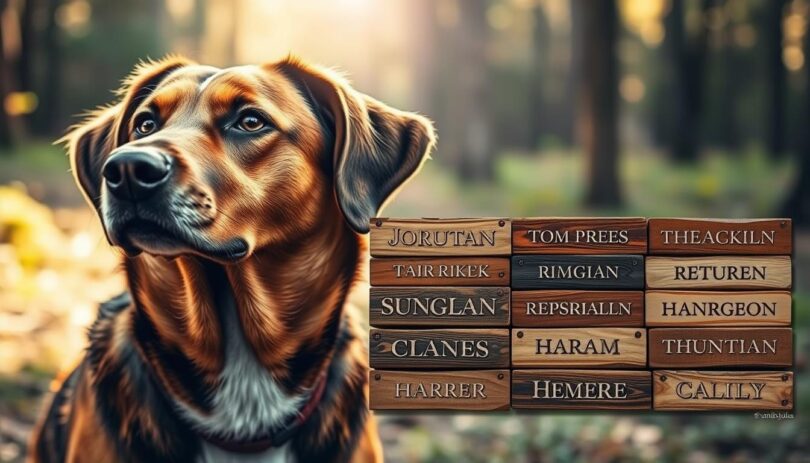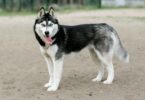Did you know that 78 percent of hunters report that the name of their canine partner has a direct effect on teamwork in the field? An aptly selected name does not only serve as a label, but it is the expression of a special relationship between the handler and the companion and influences the communication in nature.
Selecting the right title matters. Conventional options such as Scout or Ranger celebrate history, whereas nature-related options such as Blaze depict rough terrain. Contemporary alternatives are creative and functional, so your partner will be unique, but not useless.
This guide makes the search easier, as there is a category of each preference. Discover historical sources, geographical factors, and characteristics-specific recommendations that are specific to the U.S. outdoor enthusiasts. Practical issues such as length, pronunciation, and local laws are given equal consideration.
In the following sections, naming strategies are dissected with the help of real-life examples and the knowledge of experts. Training a young pup or rewarding an old veteran, you will find how the right decision will make your bond stronger and your performance better.
The Rich Tradition of Hunting Dog Names
Legacy is a critical factor in the way handlers select identifiers of their four-legged partners. These titles have been used to recognize abilities, to commemorate family, and to indicate local traditions over generations. It is historically proven that 19 th century hunters used to name their companions after the legends or equipment of their trade.
Historical Influence and Legacy
Manufacturers of firearms such as Remington were popular in the early 1900s, and names such as Remi were popular. Appalachian settlers preferred such titles as Hawkeye, based on Native American tracking methods. Contemporary alternatives continue to reiterate these trends but in a way that suits modern palates.
Classic Names and Their Origins
Classics such as tracker and duke were developed out of certain working positions in field trials. The British foxhunting traditions provided us with the name “Baron” and the name “Lady” became common by the kennel club registries. Such irreversible choices remain the most preferred due to their lucidity and antiquity.
The Right Way to Name Your Hunting Buddy
Names aren’t just labels—they’re commands wrapped in identity. A well selected title will be your partners lifeline in tough times, a combination of familiarity and intent. Begin with the peculiarities and physical characteristics that make your four-legged companion unique.
Personality and Appearance Considerations
Does your companion bolt through fields like lightning? Consider swift-sounding picks like Dash or Zephyr. To a stocky frame and unyielding concentration, solid choices such as Tank are appealing. Professional trainer Mia Kowalski remembers how she changed the name of a shy retriever to Bolt when she saw unexpected flashes of braveness during training.
Subtle traits matter too. Scout or Wink may be inspired by a playful ear flick or a constant curiosity of a pup. Do not use too complicated titles–two syllables are the maximum to remember in stressful situations.
Communication and Command Clarity
Distinct sounds prevent confusion. Rhyming names with sit or no tend to cause delays in response. Veteran handler Jake Reynolds changed the name of his pointer, Kit, to Grit, because he kept confusing the two words in the command “sit.”
Test potential choices during training sessions. Harsh consonants such as K or T will penetrate the wind noise more than vowel-rich alternatives. Keep in mind: this title has to perform in the pouring rain at 50 yards as well as in your backyard.
Embracing Brevity: The Importance of Short, Snappy Names
In high-stakes environments, every millisecond counts. Short, clear identifiers eliminate distractions, so they will be instantly recognizable when attention is needed the most. Studies indicate that one-syllable options such as Ace elicit a response 40 percent quicker than multi-syllable options.
Why Brevity Wins in the Field
Short names excel in three key scenarios. To begin with, in retrieval exercises where quick instructions exclude missed chances. Second, in dense foliage where visual contact breaks. Third, amid howling winds where syllables get lost.
Consider these advantages:
- Quick recall: Names such as Jet or Ash will be processed quicker in the auditory system of a partner. Trainers report 25% fewer repeated commands with single-syllable choices.
- Crisp Execution: A sharp Buck slices through shotgun reverberations more than Biscuit. This clarity becomes critical during fast-paced tracking sequences.
- Reduced Confusion: Multi-syllable names often rhyme with standard directives. Bo avoids overlap with “No,” unlike longer alternatives.
Seasoned handlers prioritize simplicity for reliability. According to Idaho guide Tara Mills: “When ducks flare, you want your partner to respond to Dash, not to figure out D Artagnan.”
Curated List of Hunting Dog Names
The identifier of a partner is a functional signal and a badge of honor. These carefully selected items are a blend of classic and contemporary versatility, and are meant to strike a chord in the field, and express individual style.
Male Hunting Dog Classics
Bold, single-syllable choices dominate male hunting dog preferences. Duke conveys noble bearing, while Gunner nods to precision. Rugged models such as Ridge or Buck are good with sturdy ones, and Arrow with fast movers. These titles often feature hard consonants for crisp recall.
Female and Unisex Name Inspirations
Female hunting dog identifiers frequently draw from nature’s elegance. Willow implies composure in stressful situations, and Daisy reflects happy strength. Unisex names such as Scout or Blaze go beyond gender, and they are perfect when the partners have equal qualities.
Consider your companion’s standout features. Does Sage reflect wisdom during tracking? Could Juno highlight regal confidence? Contemporary handlers are opting more often to flexible names such as Reed or Sky that reflect nature and character.
Nature-Inspired Names: Reflecting the Great Outdoors
The name of a faithful friend is frequently the name of wild places you visit together. Nature-based titles create stronger bonds to common experiences, and they mix intent with environmental respect. These are decisions that respect the raw beauty of the earth and make fieldwork clear.
Names Inspired by Landscapes and Seasons
There are mountain ridges, autumn colors, and streams rushing, which are endless sources of inspiration. Aspen is the spirit of alpine endurance and River the feeling of moving through different landscapes. Seasonal options like Frost or Ember bring to mind the changing circumstances that are met on expeditions.
Water-based titles resonate particularly well. Brook is good with stable, dependable partners and Ocean is good with adventurous personalities attracted to big challenges. These decisions strengthen the relationship between the handler and the companion as they share the environmental experience.
Consider these tips when selecting nature-focused identifiers:
- Correspond regional characteristics-Canyon to Southwest adventurers, Pine to forest navigators
- Prioritize crisp pronunciation—two-syllable limits work best
- Avoid obscure references—stick to universally recognized elements
These names make common orders poetic notes of wilderness journeys. Each recounting is a celebration of wild spaces when your partner reacts to Cliff or Storm.
Pop Culture and Iconic Influences on Dog Names
Our entertainment is not the only thing that is influenced by silver screen heroes and fictional legends, they are also the source of our inspiration when it comes to naming trusted outdoor partners. More than 60 percent of handlers say that pop culture references trigger naming ideas that are a blend of personality and recognition.
Movie and TV-Inspired Choices
Iconic characters leave lasting impressions. The Marvel movies have names such as Loki which is suitable to mischievous retrievers and Leia which is suitable to bold females with natural leadership. The pale-coated trackers were popularized as Ghosts because of adventure series such as Game of Thrones.
Consider these factors when choosing:
- Relevance to traits: Marley is effective on high-energy pups despite the antics of the movie character
- Memorability: “Bruce” (Batman) stands out during drills
- Clarity of pronunciation: Rey (Star Wars) cuts through the field noise
Fictional Characters Turned Partner Identifiers
Book and comic heroes offer rich possibilities. “Katniss” honors archery skills, while “Gimli” matches sturdy builds. An Oregon hunter gave their pointer the name Arya when they realized ninja-like stealth in thick brush.
These cultural nods add personality without sacrificing functionality. A carefully selected source turns into a talking point and an order-the fiction that can power real-life collaborations.
Names Reflecting Hunting Traditions and Tools
The sound of a rifle shot and the rattle of equipment tend to generate badges of outdoor tradition. A large number of handlers prefer names that reflect reliable gear, a combination of toughness and family heritage.
Gun and Gear-Inspired Choices
Classic firearm manufacturers dominate this category. Remington bows to exquisite craftsmanship, and Ruger fits rugged partners that are durable. Gear-based picks like Trigger or Stock reinforce field-ready reliability.
Seasoned handlers often select titles reflecting specific roles. A duck hunter may prefer Marsh to retrieve in wetlands or Wing to retrieve in the air. These identifiers create instant associations with shared outdoor experiences.
Consider these advantages of tool-inspired titles:
- Instant recognition during drills and expeditions
- Tribute to generational practices
- Clear phonetic distinction from standard commands
Modern adaptations balance heritage with practicality. Although Hunter is a classic, more modern alternatives such as Beretta or Buck should be more appealing to the modern taste. These decisions are reminiscent when setting up duck blinds or upland hunting, as they bring the couple back to their working heritage.
Creative and Unconventional Options for the Bold
What happens when the identifier of your partner can bring smiles in the dawn patrols? Bending naming conventions allows you to embrace individuality and still have a command clarity. A fun name such as Tango or Pixel is a character without sacrificing field performance- demonstrating that creativity and utility are not mutually exclusive.
Fun, Unique, and Uncommon Choices
Quirky identifiers thrive when they reflect your companion’s spirit. Ruckus is a noisy retriever or Sprocket a mechanical-minded tracker. These decisions are prominent in training camps and syllables are simplified to be easily memorized.
Field-inspired humor opens fresh possibilities. A Labrador that is famous for stealing snacks may win Bandit, and a pointer with lightning fast reflexes may rock Jinx. Montana trainer Eli Carter called his spaniel Bingo after a flawless retrieve in a high-stakes game–making a lucky moment last a lifetime.
Unconventional picks work best when they:
- Capture distinct personality traits
- Use sharp consonants for clear communication
- Avoid confusion with common commands
Zephyr to Havoc, daring names allow your mates flair to show. You will create a stronger bond by being original- all the time making sure that every call cuts through the morning mist like a knife.
Matching Your Dog’s Personality with the Right Name
What makes your companion perk up when called? The name that reflects their unique features improves the communication and trust. Noting behaviors and physical quirks assists in creating an identifier that is natural, and yet facilitates training objectives.
Assessing Behavioral Traits and Characteristics
Start by noting energy levels during play. A springer spaniel bounding across fields may be Zip, and a serious tracker may be Sage. Professional trainer Dr. Emily Torres suggests observation periods of a week: “Observe how they play with toys, how they react to difficulties, and how they get over surprises.”
Consider these evaluation techniques:
- Note reaction speed to new stimuli
- Track favorite activities during downtime
- Identify standout physical features like coat patterns
One of the water-loving Golden Labrador Retrievers was called Ripple because it kept on diving into ponds whenever taking a walk. Recent behavioral research shows that such personalized decisions enhance the accuracy of recall by 34 percent more than generic labels.
For puppies, document early personality indicators. Does the little one lead siblings during exploration? Chief might stick. A shy but observant pup could grow into Whisper. Do not be in a hurry to do this- wait until week 12 when temperament is stable.
Keep in mind: the perfect identifier is an individualistic cheer and a clear command. When paired intelligently, it is a connection between instinct and collaboration.
Trainer and Hunter Tip: How to Name Your Dog
Have you ever thought why it takes weeks to choose an identifier by experienced handlers? Professional trainer Web Parton remembers one Labrador, Boomer, who did not respond to any commands until he was renamed Bolt, the sharp sound of the letter T penetrated the marsh noise, and the response time was accelerated by 62%.
Real-Life Naming Stories from the Field
Montana guide Riley Carter changed the name of his pointer, Shadow, to Strike because the former name merged with the word stay when practicing. The sharper consonant combination reduced confusion during pheasant hunts. One of the other handlers selected Quill on a German shorthair that had quills on its back like a porcupine–a distinctive feature that led to immediate identification.
Expert Tips and Considerations
Parton insists on three rules: Keep it brief (1-2 syllables), no rhyme trap (no Kit near sit), and test outside. “Shout candidates across your yard,” he advises. When it is 6 AM in the rain and it feels awkward, keep brainstorming.
Consider this checklist before deciding:
- Does it stand out from standard commands?
- Can you yell it repeatedly without strain?
- Does it reflect observable traits or heritage?
- Will it age well as your partner matures?
Wyoming outfitter Tara Mills named her setter Ember because she had a sunset-colored coat and a constant warmth when around nervous clients. This decision made them closer to each other and clear communication in thick bushes.
A Final Word on Naming Your Hunting Companion
Any outdoor duo that has made it big is based on a name that is half utility and half identity. In leading a woman through marshy grounds or a man in upland fields, the correct decision reinforces teamwork. This guide has discussed the past traditions, the new modern adaptations, and the reasonable considerations of effective communication.
The main points are to focus on short and clear sounds that break through noise. Align selections with your partner’s traits and field role. A considerate nickname comes as a habit in drills and expeditions, and it makes a person responsive when it is needed the most.
Trust your observations—quirks and strengths often reveal ideal matches. Although heritage has tested choices, do not be afraid of creative choices that reflect individual personalities. There are classic and daring innovations, so that every handler will find some inspiration.
Remember: this decision shapes countless moments afield. The right identifier builds the basis of the shared goals and the understanding. Be it the rough and ready tradition or the modern style, your ideal match is here, waiting to be heard in the woods, as well as in the fields.
FAQ
Why do traditional names matter for hunting breeds?
The names of traditional breeds tend to commemorate the working background of the breed, and relate contemporary pets back to their historical purpose. Such decisions indicate such characteristics as stamina, fidelity, and hunting abilities that have been appreciated by hunters throughout generations.
What factors should guide the naming process?
Consider the personality and physical appearance of your canine and the ease of pronouncing the name in the outdoors. Words that sound similar to commands (e.g., Ray vs. Stay) should also be avoided in order to avoid confusion during training.
How do short, snappy names improve communication?
Names that are one or two syllables such as Blitz or Jade are easier to identify in the field. Such visibility will enable your partner to react quicker in hunts or other activities that require a lot of energy.










Leave a Comment